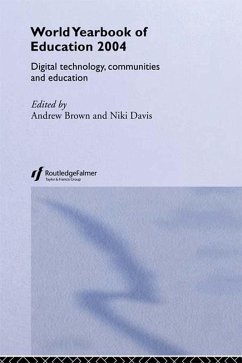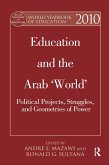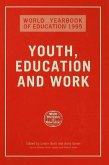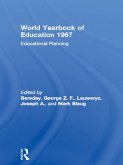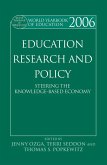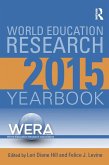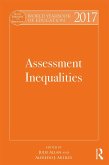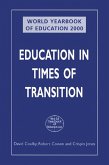World Yearbook of Education 2004 (eBook, PDF)
Digital Technologies, Communities and Education
Redaktion: Brown, Andrew; Davis, Niki
14,95 €
14,95 €
inkl. MwSt.
Sofort per Download lieferbar

7 °P sammeln
14,95 €
Als Download kaufen

14,95 €
inkl. MwSt.
Sofort per Download lieferbar

7 °P sammeln
Jetzt verschenken
Alle Infos zum eBook verschenken
14,95 €
inkl. MwSt.
Sofort per Download lieferbar
Alle Infos zum eBook verschenken

7 °P sammeln
World Yearbook of Education 2004 (eBook, PDF)
Digital Technologies, Communities and Education
Redaktion: Brown, Andrew; Davis, Niki
- Format: PDF
- Merkliste
- Auf die Merkliste
- Bewerten Bewerten
- Teilen
- Produkt teilen
- Produkterinnerung
- Produkterinnerung

Bitte loggen Sie sich zunächst in Ihr Kundenkonto ein oder registrieren Sie sich bei
bücher.de, um das eBook-Abo tolino select nutzen zu können.
Hier können Sie sich einloggen
Hier können Sie sich einloggen
Sie sind bereits eingeloggt. Klicken Sie auf 2. tolino select Abo, um fortzufahren.

Bitte loggen Sie sich zunächst in Ihr Kundenkonto ein oder registrieren Sie sich bei bücher.de, um das eBook-Abo tolino select nutzen zu können.
A real revolution is taking place in the way in which we conceptualise and practice education and learning. This book sets out to explore the immense impact which digital technology is having on education around the world.
- Geräte: PC
- mit Kopierschutz
- eBook Hilfe
- Größe: 3.01MB
Andere Kunden interessierten sich auch für
![World Yearbook of Education 2010 (eBook, PDF) World Yearbook of Education 2010 (eBook, PDF)]() World Yearbook of Education 2010 (eBook, PDF)51,95 €
World Yearbook of Education 2010 (eBook, PDF)51,95 €![World Yearbook of Education 1995 (eBook, PDF) World Yearbook of Education 1995 (eBook, PDF)]() World Yearbook of Education 1995 (eBook, PDF)33,95 €
World Yearbook of Education 1995 (eBook, PDF)33,95 €![World Yearbook of Education 1967 (eBook, PDF) World Yearbook of Education 1967 (eBook, PDF)]() World Yearbook of Education 1967 (eBook, PDF)51,95 €
World Yearbook of Education 1967 (eBook, PDF)51,95 €![World Yearbook of Education 2006 (eBook, PDF) World Yearbook of Education 2006 (eBook, PDF)]() World Yearbook of Education 2006 (eBook, PDF)51,95 €
World Yearbook of Education 2006 (eBook, PDF)51,95 €![World Education Research Yearbook 2015 (eBook, PDF) World Education Research Yearbook 2015 (eBook, PDF)]() World Education Research Yearbook 2015 (eBook, PDF)49,95 €
World Education Research Yearbook 2015 (eBook, PDF)49,95 €![World Yearbook of Education 2017 (eBook, PDF) World Yearbook of Education 2017 (eBook, PDF)]() World Yearbook of Education 2017 (eBook, PDF)37,95 €
World Yearbook of Education 2017 (eBook, PDF)37,95 €![World Yearbook of Education 2000 (eBook, PDF) World Yearbook of Education 2000 (eBook, PDF)]() World Yearbook of Education 2000 (eBook, PDF)51,95 €
World Yearbook of Education 2000 (eBook, PDF)51,95 €-
-
-
A real revolution is taking place in the way in which we conceptualise and practice education and learning. This book sets out to explore the immense impact which digital technology is having on education around the world.
Dieser Download kann aus rechtlichen Gründen nur mit Rechnungsadresse in A, B, BG, CY, CZ, D, DK, EW, E, FIN, F, GR, HR, H, IRL, I, LT, L, LR, M, NL, PL, P, R, S, SLO, SK ausgeliefert werden.
Produktdetails
- Produktdetails
- Verlag: Taylor & Francis
- Seitenzahl: 336
- Erscheinungstermin: 15. April 2013
- Englisch
- ISBN-13: 9781134311897
- Artikelnr.: 40464841
- Verlag: Taylor & Francis
- Seitenzahl: 336
- Erscheinungstermin: 15. April 2013
- Englisch
- ISBN-13: 9781134311897
- Artikelnr.: 40464841
- Herstellerkennzeichnung Die Herstellerinformationen sind derzeit nicht verfügbar.
Andrew Brown is Senior Lecturer in Education at the Institute of Education, University of London. Niki Davis is Senior Professor and Director of Iowa State University Center for Technology in Learning and Teaching and Professor of Educational Technology at the Institute of Education, University of London.
SECTION I: Digital transformations 1. Learning: a semiotic view in the
context of digital technologies Gunther Kress 2. (Dis)possessing literacy
and literature: gourmandising in Gibsonbarlowville Soh-Young Chung, Paul
Dowling and Natasha Whiteman 3. Multimedia learning in the digital world
José L. Rodríguez Illera 4. Rethinking and retooling language and
literature teaching Ronald Soetaert, Andre Mottart and Bart Bonamie 5.
Children's concepts of information and communication technology: pointers
to the impact on education within and beyond the classroom Bridget
SomekhSECTION II: Learners and teachers 6. Playing and learning with
digital technologies at home and at school Toni Downes 7. Learning and
teaching adult basic skills with digital technology: research from the UK
Harvey Mellar and Maria Kambouri 8. Teachers and teaching innovations in a
connected world Nancy Law 9. Teaching with video cases on the web: lessons
learned from the Reading Classroom Explorer Richard E. Ferdig, Laura R.
Roehler, Erica C. Boling, Suzanne Knezek, P. David Pearson and Aman Yadav
10. Networking and collective intelligence for teachers and learners
Bernard Cornu SECTION III: Intercultural interactions 11. Digital
technology to empower indigenous culture and education, Paul Resta, Mark
Christal and Loriene Roy 12. Refugee children in a virtual world:
intercultural online communication and community, Liesbeth de Block and
Julian Sefton-Green 13. The role of local instructors in making global
e-learning programmes culturally and pedagogically relevant, Michelle
Selinger 14. Case method and intercultural education in the digital age,
Marsha Gartland, Robert McNergney, Scott Imig and Marla L. Muntner 15.
Intercultural learning through digital media: the development of a
transatlantic doctoral student community, Andrew Brown and Niki
DavisSECTION IV: Building communities 16. A cross-cultural cadence in E:
knowledge building with networked communities across disciplines and
cultures, Elsebeth Sorensen and Eugene Takle 17. Telecollaborative
communities of practice in education within and beyond Canada, Thérèse
Laferrière, Alain Breuleux and Gaalen Erickson 18. Informatics teacher
training in Hungary: building community and capacity with tele-houses,
Marta Turcsányi-Szabó 19. Building communities of practice in 'New' Europe,
Christina Preston and Laura Lengel 20. A systemic approach to educational
renewal with new technologies: empowering learning communities in Chile,
Pedro Hepp, Enrique Hinostroza and Ernesto Laval
context of digital technologies Gunther Kress 2. (Dis)possessing literacy
and literature: gourmandising in Gibsonbarlowville Soh-Young Chung, Paul
Dowling and Natasha Whiteman 3. Multimedia learning in the digital world
José L. Rodríguez Illera 4. Rethinking and retooling language and
literature teaching Ronald Soetaert, Andre Mottart and Bart Bonamie 5.
Children's concepts of information and communication technology: pointers
to the impact on education within and beyond the classroom Bridget
SomekhSECTION II: Learners and teachers 6. Playing and learning with
digital technologies at home and at school Toni Downes 7. Learning and
teaching adult basic skills with digital technology: research from the UK
Harvey Mellar and Maria Kambouri 8. Teachers and teaching innovations in a
connected world Nancy Law 9. Teaching with video cases on the web: lessons
learned from the Reading Classroom Explorer Richard E. Ferdig, Laura R.
Roehler, Erica C. Boling, Suzanne Knezek, P. David Pearson and Aman Yadav
10. Networking and collective intelligence for teachers and learners
Bernard Cornu SECTION III: Intercultural interactions 11. Digital
technology to empower indigenous culture and education, Paul Resta, Mark
Christal and Loriene Roy 12. Refugee children in a virtual world:
intercultural online communication and community, Liesbeth de Block and
Julian Sefton-Green 13. The role of local instructors in making global
e-learning programmes culturally and pedagogically relevant, Michelle
Selinger 14. Case method and intercultural education in the digital age,
Marsha Gartland, Robert McNergney, Scott Imig and Marla L. Muntner 15.
Intercultural learning through digital media: the development of a
transatlantic doctoral student community, Andrew Brown and Niki
DavisSECTION IV: Building communities 16. A cross-cultural cadence in E:
knowledge building with networked communities across disciplines and
cultures, Elsebeth Sorensen and Eugene Takle 17. Telecollaborative
communities of practice in education within and beyond Canada, Thérèse
Laferrière, Alain Breuleux and Gaalen Erickson 18. Informatics teacher
training in Hungary: building community and capacity with tele-houses,
Marta Turcsányi-Szabó 19. Building communities of practice in 'New' Europe,
Christina Preston and Laura Lengel 20. A systemic approach to educational
renewal with new technologies: empowering learning communities in Chile,
Pedro Hepp, Enrique Hinostroza and Ernesto Laval
SECTION I: Digital transformations 1. Learning: a semiotic view in the
context of digital technologies Gunther Kress 2. (Dis)possessing literacy
and literature: gourmandising in Gibsonbarlowville Soh-Young Chung, Paul
Dowling and Natasha Whiteman 3. Multimedia learning in the digital world
José L. Rodríguez Illera 4. Rethinking and retooling language and
literature teaching Ronald Soetaert, Andre Mottart and Bart Bonamie 5.
Children's concepts of information and communication technology: pointers
to the impact on education within and beyond the classroom Bridget
SomekhSECTION II: Learners and teachers 6. Playing and learning with
digital technologies at home and at school Toni Downes 7. Learning and
teaching adult basic skills with digital technology: research from the UK
Harvey Mellar and Maria Kambouri 8. Teachers and teaching innovations in a
connected world Nancy Law 9. Teaching with video cases on the web: lessons
learned from the Reading Classroom Explorer Richard E. Ferdig, Laura R.
Roehler, Erica C. Boling, Suzanne Knezek, P. David Pearson and Aman Yadav
10. Networking and collective intelligence for teachers and learners
Bernard Cornu SECTION III: Intercultural interactions 11. Digital
technology to empower indigenous culture and education, Paul Resta, Mark
Christal and Loriene Roy 12. Refugee children in a virtual world:
intercultural online communication and community, Liesbeth de Block and
Julian Sefton-Green 13. The role of local instructors in making global
e-learning programmes culturally and pedagogically relevant, Michelle
Selinger 14. Case method and intercultural education in the digital age,
Marsha Gartland, Robert McNergney, Scott Imig and Marla L. Muntner 15.
Intercultural learning through digital media: the development of a
transatlantic doctoral student community, Andrew Brown and Niki
DavisSECTION IV: Building communities 16. A cross-cultural cadence in E:
knowledge building with networked communities across disciplines and
cultures, Elsebeth Sorensen and Eugene Takle 17. Telecollaborative
communities of practice in education within and beyond Canada, Thérèse
Laferrière, Alain Breuleux and Gaalen Erickson 18. Informatics teacher
training in Hungary: building community and capacity with tele-houses,
Marta Turcsányi-Szabó 19. Building communities of practice in 'New' Europe,
Christina Preston and Laura Lengel 20. A systemic approach to educational
renewal with new technologies: empowering learning communities in Chile,
Pedro Hepp, Enrique Hinostroza and Ernesto Laval
context of digital technologies Gunther Kress 2. (Dis)possessing literacy
and literature: gourmandising in Gibsonbarlowville Soh-Young Chung, Paul
Dowling and Natasha Whiteman 3. Multimedia learning in the digital world
José L. Rodríguez Illera 4. Rethinking and retooling language and
literature teaching Ronald Soetaert, Andre Mottart and Bart Bonamie 5.
Children's concepts of information and communication technology: pointers
to the impact on education within and beyond the classroom Bridget
SomekhSECTION II: Learners and teachers 6. Playing and learning with
digital technologies at home and at school Toni Downes 7. Learning and
teaching adult basic skills with digital technology: research from the UK
Harvey Mellar and Maria Kambouri 8. Teachers and teaching innovations in a
connected world Nancy Law 9. Teaching with video cases on the web: lessons
learned from the Reading Classroom Explorer Richard E. Ferdig, Laura R.
Roehler, Erica C. Boling, Suzanne Knezek, P. David Pearson and Aman Yadav
10. Networking and collective intelligence for teachers and learners
Bernard Cornu SECTION III: Intercultural interactions 11. Digital
technology to empower indigenous culture and education, Paul Resta, Mark
Christal and Loriene Roy 12. Refugee children in a virtual world:
intercultural online communication and community, Liesbeth de Block and
Julian Sefton-Green 13. The role of local instructors in making global
e-learning programmes culturally and pedagogically relevant, Michelle
Selinger 14. Case method and intercultural education in the digital age,
Marsha Gartland, Robert McNergney, Scott Imig and Marla L. Muntner 15.
Intercultural learning through digital media: the development of a
transatlantic doctoral student community, Andrew Brown and Niki
DavisSECTION IV: Building communities 16. A cross-cultural cadence in E:
knowledge building with networked communities across disciplines and
cultures, Elsebeth Sorensen and Eugene Takle 17. Telecollaborative
communities of practice in education within and beyond Canada, Thérèse
Laferrière, Alain Breuleux and Gaalen Erickson 18. Informatics teacher
training in Hungary: building community and capacity with tele-houses,
Marta Turcsányi-Szabó 19. Building communities of practice in 'New' Europe,
Christina Preston and Laura Lengel 20. A systemic approach to educational
renewal with new technologies: empowering learning communities in Chile,
Pedro Hepp, Enrique Hinostroza and Ernesto Laval
